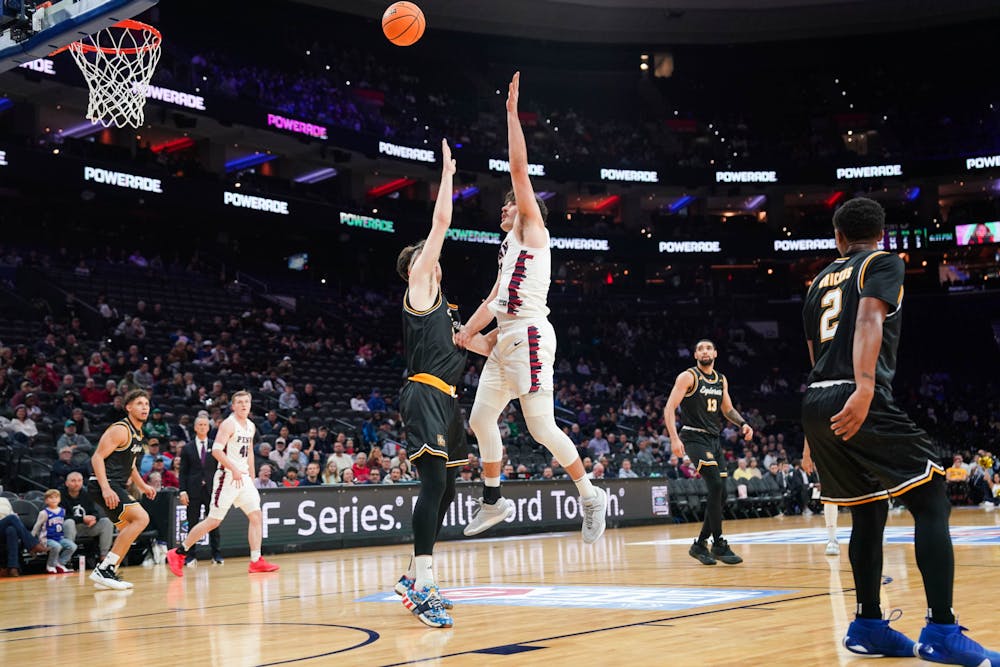
Junior forward/center Nick Spinoso during the team's matchup against La Salle at the Wells Fargo Center on Dec. 2.
Credit: Anna VazhaeparambilIn sports, there are always games teams circle on the calendar. From rivalries to big-time opponents, some matchups just mean more.
For Penn men’s basketball, one such game this season is undeniably Saturday’s matchup with the Kentucky Wildcats. And while a win in that game would be a monumental moment for the Quakers, getting the game on the schedule at all is just as impressive a feat.
“It’s a lot like recruiting,” Penn senior associate athletic director Josh LaRosa said of the process of scheduling big non-conference games. “You’re gonna have a lot of conversations, cast a wide net, and ultimately it takes some luck for things to align. In this situation, the coaches were willing to play, and we looked at bringing a blue blood program like Kentucky to the city as an absolute win for us.”
Kentucky, who is currently ranked No. 16 in the country, is one of several high-profile opponents the Quakers will play before their Ivy League slate begins. Others include Auburn — another member of the SEC — and Houston, a one-seed in last year’s NCAA Tournament. These games are far from mandatory for the Quakers — they will not contribute to the team’s Ancient Eight title chase, nor will they give Penn much of a chance at an at-large bid in March Madness. Rather, it is about giving the Red and Blue the chance to prove their mettle against the best the country has to offer.
According to Penn coach Steve Donahue, who has been around the program for decades, this type of aggressive scheduling is nothing new.
“We’ve always done that here,” Donahue said. “I think it’s a part of Penn basketball. … We try to separate ourselves from our peers in the [Ivy] League by playing this competition. … There was a stretch before the pandemic where we beat Miami here, Villanova here, at Providence, at Alabama, at New Mexico, at Dayton. And they were all money games.”
A “money game,” as Donahue calls it, is when a big-time program pays a smaller school a sum of money to travel and play them. Penn’s games against Auburn and Houston, both on the road, likely fall into this category. But to get a legendary program like Kentucky to travel to Philadelphia and play Penn, many other stars have to align.
First, it starts with a relationship. Donahue says that after nearly 40 years in college basketball, he “probably knows someone on every staff,” and that connecting with fellow coaches is often the first piece of the puzzle. Next, all parties involved have to be on the same page. LaRosa says programs like Kentucky schedule their non-conference games up to four years in advance, and that many would-be matchups fall through simply because the dates don’t work out.
Finally, there has to be an incentive for both teams. According to LaRosa, one of the driving factors for Kentucky was bringing their players home — the Wildcats have six players who hail from either Pennsylvania or New Jersey, including Justin Edwards, Aaron Bradshaw, and D.J. Wagner, all freshman who were former five-star recruits and all of whom hail from the Philadelphia metropolitan area.
With that, the deal was done, and one of the biggest games in Penn basketball history was officially set.
“It’s just really special,” Donahue said. “For Kentucky to come here, in our home city, and then for our guys to experience that game in Wells Fargo.”
And while a victory over Kentucky will not move the Quakers any closer to their seminal objective, an Ivy League title, there is something indescribable about the type of test a team like the Wildcats can offer. Donahue says that it tells him what a player is capable of — what type of competitor they are. But if you ask LaRosa, the benefit is even simpler.
“To be the best, you have to beat the best.”
The Daily Pennsylvanian is an independent, student-run newspaper. Please consider making a donation to support the coverage that shapes the University. Your generosity ensures a future of strong journalism at Penn.
Donate







